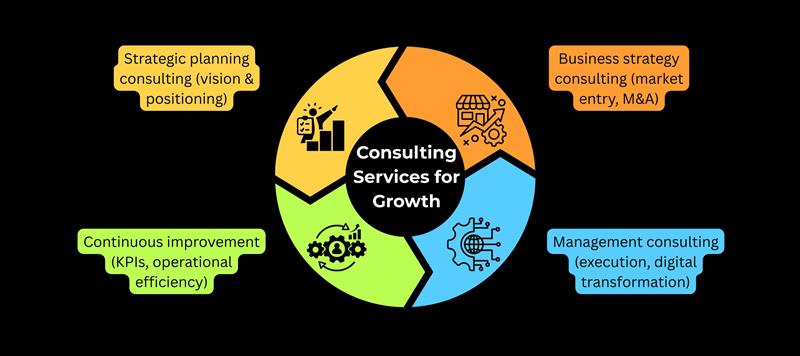The current trend is that businesses are getting disrupted at a faster rate today due to AI implementation and the changing global supply chains. Choosing between Strategic planning consulting and Management consulting can make the difference between business survival and demise. In 2024, the global management consulting market is over $1 trillion and is experiencing increased growth in strategy-related engagements as companies are buying future-ready direction and implementation roadmaps.
A CEO of any company should decide to enter a new market with AI-enabled products to reduce costs and stabilise operations. Business strategy consulting puts the context of where and why and helps in the market selection, portfolio choices and long-term value creation. The management consulting achieves that vision through process redesign, change management, and capability building. The optimal combination of the two transforms strategy into definite results.
What is Strategy Consulting?
Strategy consultants assist leaders with defining a competitive advantage, a corporate or business-unit strategy, and future investment priorities. The role of strategy consultants is to perform work like market-entry due diligence, M&A strategy and corporate portfolio redesign. They are mainly employed by the C-suite and boards to define long-term orientation.
What is the Management Consulting?
Management consultants put the strategy into action: operational changes, cost reduction, process change with technology and programme management. They collaborate with functional leaders to execute solutions and monitor the KPIs. This team is concerned with implementation, process, and the long-term enhancement of performance.
Strategy vs Management Consulting
Aspect | Strategy Consulting | Management Consulting |
Objective | Shape vision, define long-term direction, and determine competitive positioning. | Improve efficiency, streamline operations, manage execution |
Time Horizon | Long-term (3–10+ years) | Short to medium term (0–36 months) |
Primary Focus | Market entry, diversification, M&A, growth opportunities, risk management | Process optimisation, digital transformation, change management, cost control |
Clients | C-suite executives, board members, investors | Business heads, operations leaders, middle–senior management |
Engagement Duration | Typically 3–6 months for corporate strategy projects; may extend for portfolio realignment | Often 6–18 months for implementation and change programmes |
Typical Deliverables | Strategic roadmap, business model redesign, investment cases, transformation vision | Implementation plan, operating model redesign, KPI dashboards, training & adoption frameworks |
Skillsets Involved | Industry analysis, financial modelling, competitive benchmarking, scenario planning | Process engineering, project management, technology deployment, performance improvement |
Tools & Methodologies | SWOT, PESTLE, Porter’s Five Forces, market sizing, valuation models | Lean Six Sigma, Agile frameworks, ERP/CRM implementation, data analytics |
Output | Clear direction: “What to do and why” | Practical execution: “How to do it and when” |
Value Creation | Strategic clarity, future-proofing, investor confidence, new revenue opportunities | Efficiency gains, cost savings, faster adoption of digital tools, sustainable performance |
Selection Advice
Select Strategy Consulting when structural decisions are at hand: new markets, platform bets, divestitures, or AI-driven business models. (Example: Currently, most companies are implementing AI as part of corporate strategy, with nearly half of technology leaders indicating that AI is part of core business strategy).
Recommend Management Consulting in cases of requiring execution muscle: Digital project backlog, operational drag, or low rate of change adoption. When there has been a strategy of failure in delivery, management consulting revives the momentum.
Latest Data & Market Signals
The management consulting services market size across the globe is estimated to be approximately 1.0+ trillion in 2024 and is projected to increase in the mid-single digits per annum as regulatory complexity and digital transformation continue to drive demand.
Such regional markets as India were experiencing faster consulting demand, with project growth of about 11% in 2024 due to technology investments, infrastructure, and growth in the private sector. This brings out an economic benefit of firms that match the strategy and local ability to execute.
Even as some of the firms report margin pressures, leading firms are spending heavily on technology and AI capabilities.

Economic Benefits
- Quicker Time-to-Value: Strategy and execution allow less time to elapse between decision and deliverable results.
- Less Total Cost of Ownership: Well-scoped strategy precludes expensive rework; narrowed management consulting eliminates waste.
- Improved Risk Control: Shared evaluations detect execution risks at an initial stage and spend mitigation funds in a wise way.
- Competitive Advantage: Companies that integrate business strategy consulting with strong implementation win market share at a greater rate.
Convergence and Specialisation
The consulting business is moving in the direction of hybrid models: strategy firms that are adding implementation units and management consultancies that are developing strategy capabilities. The consulting services that combine data science, AI strategy and operational delivery will increase in demand, with preference going to firms that are able to offer end-to-end value chains, from C-suite vision through to shop-floor actions.









